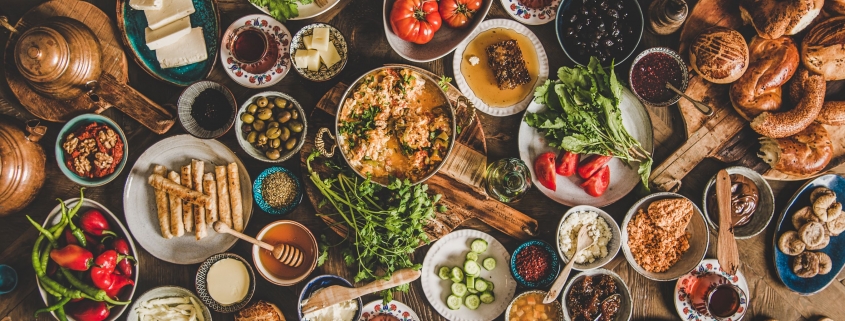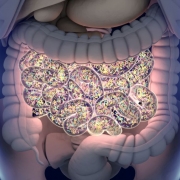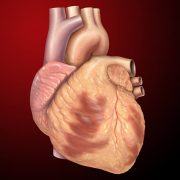Breaking Down How Digestive Enzymes Support Your Health
When it comes to digestion, your job is easy. You cook, chew, swallow, and clean up. But after your plate is empty, the hard part starts. A cohort of digestive worker bees handles the arduous task of transforming chunks of chewed up nutrition into more useful forms. And from your mouth to small intestine, digestive enzymes bear the brunt of breaking down your diet into accessible, absorbable pieces.
You’re probably more familiar with the mechanical methods used to turn your afternoon apple into glucose, fiber, and micronutrients. That’s because you can feel your teeth biting, cutting, and grinding food up. You can even detect the churning of food in your stomach.
Digestive enzymes’ work goes undetected while it’s happening—because it occurs on a microscopic scale. Enzymes are specialized proteins throughout your body that support the activity of various important chemical reactions. These enzyme-driven reactions happen all the time without you knowing. But you’d feel the absence if your digestive enzymes took a day off.
That’s because these specialized proteins support healthy digestion. The enzymes working all along the digestive conveyor belt aid in breaking down food. This action is why digestive enzymes help you feel less bloated and full, while also assisting with other occasional issues that can occur when you eat too much.*
But that’s only one of the ways digestive enzymes support your health. Your body can’t use what it can’t absorb. Creating smaller molecules out of your food’s macronutrients is key for maintaining optimal whole-body nourishment. After enzyme-aided reactions occur, your dietary nutrition is able to soaked up by the small intestine—and eventually spread to the cells of your body.*
Without digestive enzymes, eating would be nothing more than an excuse to gnash your teeth. So follow your food’s digestion journey and meet the important digestive enzymes at each stop that help support the breakdown and healthy, efficient absorption of your dietary nutrition.*
A Quick Guide to Natural Digestive Enzymes
Specific chemical reactions in your body require unique enzymes to support their normal activity. This could make for a very lengthy list of digestive enzymes. But here are four of the most important and well-known digestive enzymes and how they’re involved in supporting healthy digestion:*
- Amylase for starches
- Lipase for fats
- Protease for proteins
- Lactase for the milk protein lactose
You can also think of amylase, lipase, protease as categories of enzymes. Along the digestive journey, there are different subsets of each main enzyme type that breaks down the major macronutrients.
The Mouth: It Starts with Saliva
Your mouth waters at the sight or smell of an impending meal. This isn’t some cartoonish reaction to a delicious dinner. It’s an important step that delivers the digestive enzymes that kick off digestion.
Your salivary glands are responsible for producing several enzymes carried in saliva and mixed with food as you chew. These specific digestive enzymes—including amylase—start the process of breaking down carbohydrates into simpler sugars.
The Stomach: More than Acid
Your stomach growls, rumbles, and expands if it gets too full. That makes your stomach the central concern when you talk about eating. And it does have a big, messy job to do—one that couldn’t be completed without the help of digestive enzymes.
Along with stomach acid, a protease called pepsin—released by the cells of your stomach wall—combines with fat- and carb-crunching enzymes to disassemble macronutrients. That’s how the fats, carbs, and protein of your diet are churned, mixed, and deconstructed into a liquid called chyme.
At this point, your meal is well on its way to a state of acceptable absorbability. But there are a few more organs and their enzymes that need to join the digestive party before nutrient absorption happens.
The Pancreas: A Powerful Enzyme-Excreting Organ
Your pancreas provides a lot of juice to help move food closer to its digestive destiny. Between your stomach and small intestine, enzymes produced in the pancreas take a turn breaking down your food further. They enter through ducts into the duodenum—located in the very upper portion of your small intestines.
These diverse digestive enzymes are secreted to specifically disassemble proteins into amino acids or peptides, and fats into their component fatty acids and glycerol. Carbohydrates are also further simplified at this stage of digestion.
Although not a digestive enzyme, bile from the liver is also key at this stage to helping support the breakdown of fats you eat.
The Small Intestine: Enzymes at the Site of Absorption
You wouldn’t recognize that apple or sandwich you ate by the time it reaches your small intestine. It’s been chewed up, churned about, and broken down.
But there’s one more set of digestive enzymes needed to finish the job and make final preparations for absorption. These enzymes finish the job of simplifying carbohydrates into glucose or fructose and further deconstruct proteins into their base building blocks—amino acids.
At that point, the digestive enzymes have done their job. Your food’s nutrients are ready to be absorbed and distributed throughout your body to help maintain your energy and overall health.*
Stock Your System with Foods Containing Natural Digestive Enzymes
You’ve read about the digestive enzymes your body produces throughout your digestive system. But you can support healthy digestion by adding some enzyme-enhanced foods to your diet.*
Select your favorites from the list below and build meals around them for a boost of digestive enzymes that can help you maintain normal digestion. They’ll also help you maximize your meals by supporting the processes that make nutrients as available as possible for absorption.*
- Honey
- Pineapple
- Mango
- Bananas
- Papaya
- Fermented foods (like sauerkraut, miso, or kimchi)
- Avocado
- Kiwi
- Ginger
*These statements have not been evaluated by the Food & Drug Administration. This product is not intended to diagnose, treat, cure, or prevent any disease.
References
https://www.webmd.com/diet/what-are-digestive-enzymes#1
https://sites.psu.edu/thealimentarystudents/2014/03/10/gi-enzymes-and-their-importance-in-digestion/
https://www.sciencelearn.org.nz/resources/1840-digestive-enzymes.
https://www.verywellhealth.com/what-are-digestive-enzymes-1945036
https://www.healthline.com/health/why-are-enzymes-important
https://www.ncbi.nlm.nih.gov/books/NBK54127/
https://www.healthline.com/nutrition/natural-digestive-enzymes










